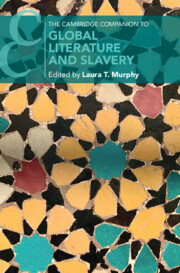Book contents
- The Cambridge Companion to Global Literature and Slavery
- The Cambridge Companion to Global Literature and Slavery
- Copyright page
- Contents
- Contributors
- Acknowledgments
- Chronology
- Introduction
- Part I Contexts and Contestation
- Part II Forms and Figures
- Part III Legacies and Afterlives
- Chapter 8 Slavery and the Virtual Archive: On Iran’s Dāsh Ākul
- Chapter 9 Impossible Revolutions? The Contemporary Afterlives of the Medieval Slave Rebellion of the Zendj
- Chapter 10 Slavery and Indenture in the Literatures of the Indian Ocean World
- Chapter 11 Rehearsing the Past
- Part IV Metaphors and Migrations
- Further Reading
- Index
- Cambridge Companions To …
Chapter 9 - Impossible Revolutions? The Contemporary Afterlives of the Medieval Slave Rebellion of the Zendj
from Part III - Legacies and Afterlives
Published online by Cambridge University Press: 15 December 2022
- The Cambridge Companion to Global Literature and Slavery
- The Cambridge Companion to Global Literature and Slavery
- Copyright page
- Contents
- Contributors
- Acknowledgments
- Chronology
- Introduction
- Part I Contexts and Contestation
- Part II Forms and Figures
- Part III Legacies and Afterlives
- Chapter 8 Slavery and the Virtual Archive: On Iran’s Dāsh Ākul
- Chapter 9 Impossible Revolutions? The Contemporary Afterlives of the Medieval Slave Rebellion of the Zendj
- Chapter 10 Slavery and Indenture in the Literatures of the Indian Ocean World
- Chapter 11 Rehearsing the Past
- Part IV Metaphors and Migrations
- Further Reading
- Index
- Cambridge Companions To …
Summary
The present chapter studies two contemporary Algerian narratives retelling the medieval rebellion of the Zendj, Black Africans brought as slaves to the marshes of Lower Iraq, who revolted against the power of the Abbasid Caliphate. Considered as the greatest servile insurrection of the medieval Arab-Muslim world, Jamel Eddine Benchecikh’s novel Rose noire sans parfum (1998) and Tareq Teguia’s film Révolution Zenj (2013) revisit this evocative episode in the global history of slavery, merging racial and economic exploitation with religious conflict and the struggle for liberation in an age of empire. The chapter focuses on Benchecikh and Teguia’s creative responses to the silence to which the Zendj have been condemned by the Arabic sources of the time, pointing out the different stylistic paths they take to trace analogies between the Zendj Rebellion and the contemporary forms of oppression, racism, and sectarian strife they witness across Algeria, Iraq, Palestine, and Europe. Expressing the rage of the oppressed, their narratives denounce the inequalities and injustices of the postcolonial and globalized world, investigating their causes while inviting audiences within and outside the Arab World to join in the Zendj’s unconcluded struggle for liberation across the centuries.
Keywords
- Type
- Chapter
- Information
- The Cambridge Companion to Global Literature and Slavery , pp. 150 - 163Publisher: Cambridge University PressPrint publication year: 2022

